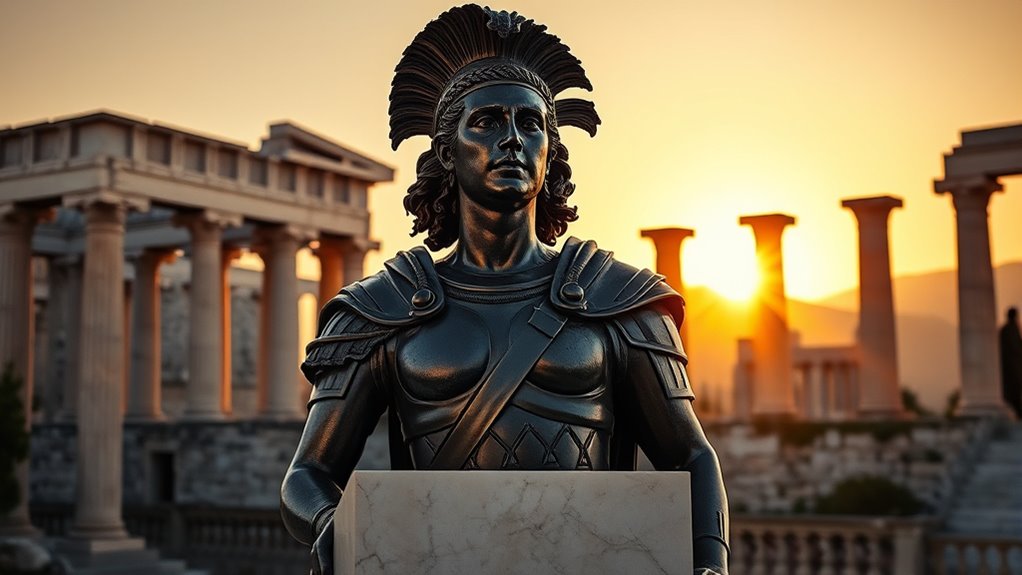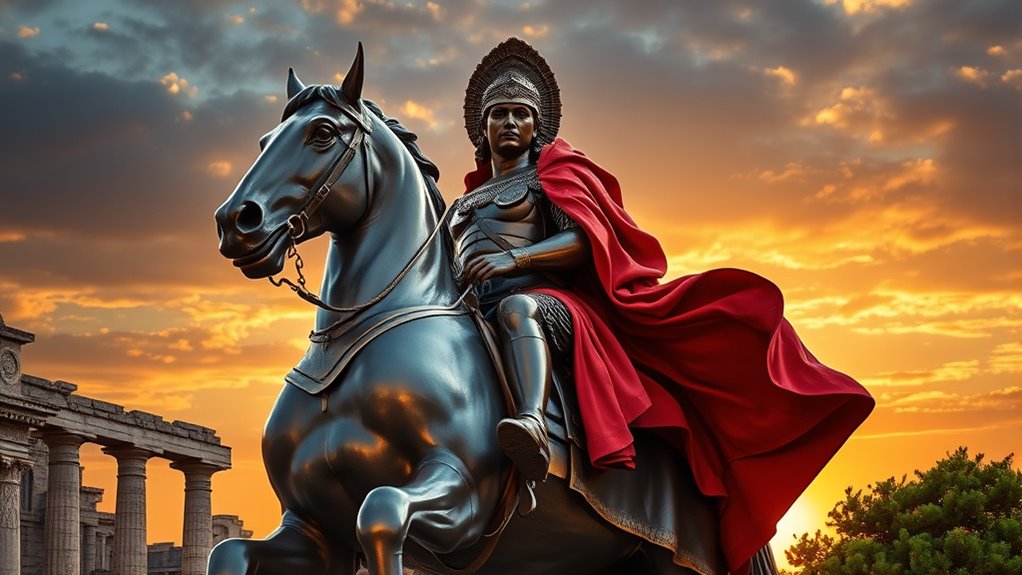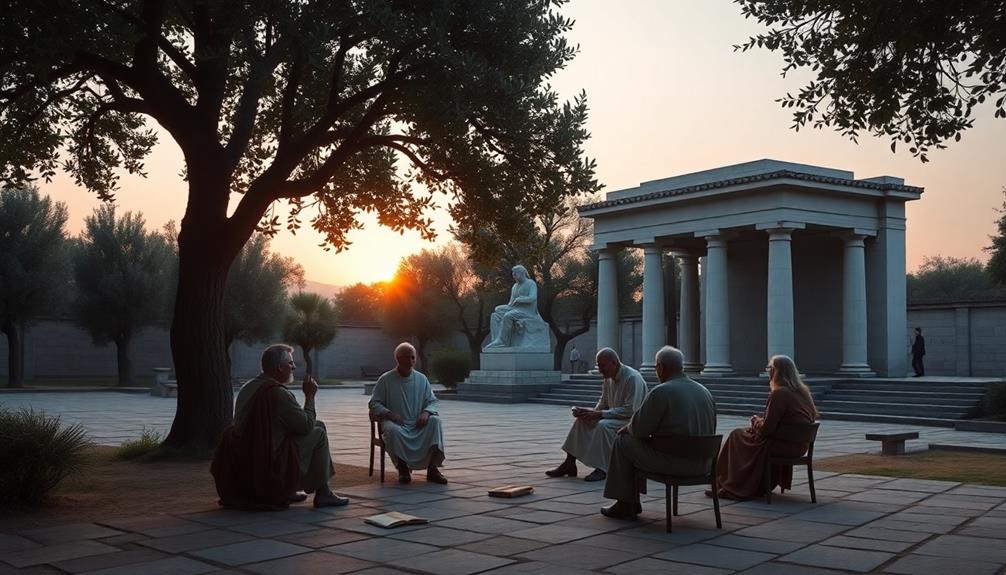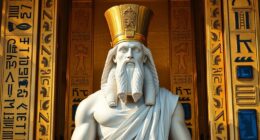Alexander the Great’s legendary status blends history, myth, and legend through his incredible military skills, innovative tactics, and cultural impact. You’ll see how he conquered vast territories, reshaped warfare, and fostered cultural fusion across his empire’s diverse peoples. His leadership inspired loyalty and transformed cities like Alexandria into centers of learning. If you keep exploring, you’ll uncover the fascinating stories behind his enduring influence that continue to inspire and mystify today.
Key Takeaways
- Alexander’s military innovations and conquests blend factual history with legendary tales of unmatched genius and daring tactics.
- His cultural policies and city foundations fostered myths of a visionary leader shaping the Hellenistic world.
- Legendary stories of his personal bravery and strategic brilliance have elevated him to near-mythic status.
- His influence on art, science, and governance contributed to a legend that transcends historical records.
- The fusion of real achievements and mythologized narratives solidifies his legacy as both a historical figure and legendary icon.

Have you ever wondered how one man could conquer most of the known world by the age of thirty? Alexander the Great’s extraordinary achievements stem from his mastery of military tactics and his profound cultural influence. From a young age, he was trained to think strategically, learning from seasoned generals and studying the art of warfare. His military tactics were revolutionary for his time, blending swift cavalry charges, innovative siege techniques, and coordinated infantry movements that overwhelmed larger armies. You can imagine how his ability to adapt battle plans on the fly gave him an edge over his enemies, turning seemingly impossible battles into victories. These tactics weren’t just about winning; they reshaped the way wars were fought. Every conquest he undertook introduced new military ideas, spreading innovation across territories. His armies weren’t just conquerors; they were carriers of a new way to fight, influencing future generations of soldiers and generals.
But his impact extended far beyond military success. Alexander’s cultural influence was equally significant. As he expanded his empire, he didn’t just impose his rule—he integrated the customs, religions, and traditions of the lands he conquered. Imagine how he encouraged intercultural exchange, blending Greek ideas with local practices, which led to a vibrant, diverse empire. He founded cities like Alexandria, which became centers of learning and culture, where Greek language, art, and philosophy mingled with local traditions. This cultural fusion created a legacy that endured long after his death, shaping the Hellenistic world and influencing art, science, and governance. You might see how his approach to cultural integration helped solidify loyalty among his diverse subjects, making his empire more than just a collection of conquered lands—it became a melting pot of ideas and innovations.
His ability to lead with charisma and vision helped him inspire loyalty among his troops, even in the face of hardships. His military genius and openness to cultural exchange are what made him legendary. You can appreciate how his strategies and cultural policies set the stage for a new era—one where military prowess and cultural understanding went hand in hand. In the end, Alexander’s legacy isn’t just about the vast territories he claimed; it’s about how he changed the face of history, blending myth and reality into a story of ambition, ingenuity, and cultural transformation.
Frequently Asked Questions
What Was Alexander’s Childhood Like?
You can imagine Alexander’s childhood as an ancient childhood filled with a royal upbringing. From a young age, he was exposed to leadership and military training, thanks to his royal status. His education was intense, studying under Aristotle and learning strategy and philosophy. This early exposure to power and knowledge shaped his ambitious spirit, preparing him to become one of history’s greatest conquerors.
Did Alexander Have Any Known Rivals or Enemies?
You should know that Alexander faced legendary enemies and fierce ancient rivalries. His most notable rival was King Darius III of Persia, whose armies clashed with Alexander’s unstoppable force. He also contended with rebellious satraps and ambitious generals within his own ranks. These rivals pushed him to the brink, fueling his legendary reputation. His enemies weren’t just threats—they became symbols of the epic battles that defined his extraordinary conquests.
How Did Alexander Die?
You learn that Alexander the Great’s death remains a mystery, with many theories swirling around it. Some suggest ancient poison theories, proposing he was secretly poisoned, while others believe he succumbed to a fever, possibly from typhoid or malaria. Despite extensive research, the exact cause of his death isn’t confirmed. Theories continue to fuel debates, keeping Alexander’s demise one of history’s intriguing puzzles.
Are There Any Surviving Artifacts From Alexander’s Time?
Imagine scrolling through your favorite museum’s virtual tour—yes, you can see ancient relics today. Some archaeological finds and ancient relics from Alexander’s era still survive, like his sword, coins, and inscriptions. These artifacts offer a glimpse into his world. While many items are lost to time, ongoing excavations sometimes uncover new treasures, keeping the legend alive and enriching our understanding of this iconic leader.
What Myths About Alexander Persisted During His Lifetime?
You might not realize, but during his lifetime, myths about Alexander’s divine status and legendary feats persisted widely. People believed he was a descendant of gods, which boosted his authority. His extraordinary achievements, like crossing the Hindu Kush and founding cities, were often exaggerated or seen as divine acts. These stories reinforced his image as a semi-divine ruler, blending fact and legend to inspire loyalty and admiration among his followers.
Conclusion
So, there you have it—Alexander the Great, a guy who literally thought he was invincible, yet left behind a trail of myths taller than his conquests. Maybe his legend was just a clever way to keep history interesting, or perhaps he knew that fame’s best served with a little mythical spice. Either way, you’re now officially in the club of those who’ve pondered whether history’s greatest conqueror was more legend than man. Cheers to that!









